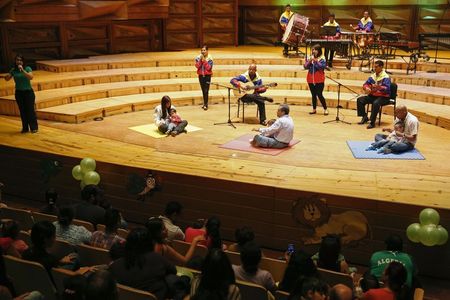By Diego Ore
CARACAS (Reuters) - When Adan Bello was born in Caracas, he barely cried.
Then the Venezuelan baby's blinking eyes turned towards the calm melody of a duo of harpists playing Brahms' "Cradle Song" in the corner of a public hospital's maternity wing.
Minutes later, his mother received a certificate signing Adan up for Venezuela's hugely successful classical music programme, known as "El Sistema" (The System).
Adan was given a tiny replica violin.
The state-run System has since its inception in 1975 trained 2.5 million youngsters, mostly from low-income backgrounds, including Gustavo Dudamel, the renowned conductor of The Los Angeles Philharmonic.
"A child who takes up a musical instrument is a child who will never raise a weapon," said Leonardo Mendez, coordinator of The System's latest "New Members" initiative.
In a nation awash with guns and with one of the world's highest murder rates, The System has for decades sought to counteract poor children's exposure to violence with the gentle and inspiring influence of classical music.
It used to only admit children aged at least 5. But under its latest "New Members" projects, hundreds of smaller infants can receive voice lessons, musical initiation with paper-made instruments, and free concerts, at its base in Caracas.
And some System musicians are fanning out to hospitals, like the one where Bello was born, playing classical themes to mothers in labour to inspire new music-lovers even before birth.
"WHY WAIT?"
It was Jose Antonio Abreu, a Venezuelan economist and musician, who founded The System four decades ago to help children and teens escape crime in the slums.
The programme has had a huge positive impact in Venezuela, and also been copied in South American nations like Colombia, Peru, Bolivia, and further afield in places from Scotland to Sweden as well U.S. cities like Los Angeles.
Seven out of 10 children who go into The System come from poor households in a country where almost a third of the population remain in poverty despite its huge oil reserves.
The "New Members" programme, which began in December 2012, was conceived when Mendez had an epiphany: his 3-year-old daughter could not sleep so he began putting on a CD of classical music and a few minutes later, she would nod off.
Realizing music helps relax kids and quicken cognitive development, he used that hook to attract pregnant and mothers with young children, and enrol them into the project.
"Why wait that long if we can engage children from the moment of birth?" the 42-year-old professional trumpeter asked.
Experts say the ear is the one of the most highly developed organs in a child. They can hear three months before birth, said Fatima Fernandez, a professor of "musical gymnastics" for pregnant mothers at The System.

"It's amazing how you feel the baby reacting according to the different rhythms," one mother, Abigail Vazquez, said, patting her eight-month paunch at a recent class. "Music is joy, happiness and that gives you happier children".
(Aditional reporting by Efrain Otero; Editing by Andrew Cawthorne and W Simon)
